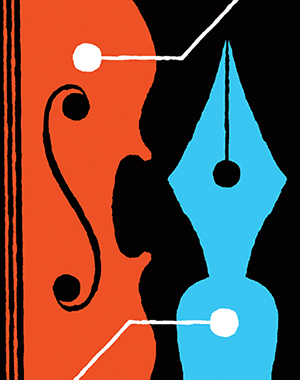
The late William H. Youngren ’53, for many years professor of English at Boston College, obtained a second doctorate, this one in music, from Brandeis. He wrote about music in The Atlantic and elsewhere, along with reviewing new recordings for Fanfare magazine. His classmate William H. Pritchard, Amherst’s Henry Clay Folger Professor of English, Emeritus, and an instrumentalist himself (he plays piano), has gathered some of Youngren’s criticism in a book, Of Music and Musicians.
There are illuminating and unexpected judgments on nearly every page, often stiffened by Youngren’s training in musicology: that Paul Whiteman was no deep-dyed villain or mere vulgarisateur, and certainly didn’t drive Bix Beiderbecke to drink himself to death; that “Strange Fruit” was the ruination of Billie Holiday; and that, after Louis Armstrong lapsed into a mere—mere!—entertainer, any one of his recordings can recall momentarily the glory of his best work.

